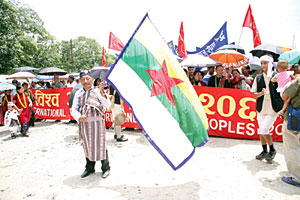 MIN RATNA BAJRACHARYA |
The Maoist party today is as near to splitting as it has ever got. But it doesn't quite seem to be able to get around to dividing.
The leadership has tried to give the internal rifts a positive spin, by characterising it as a normal two-line struggle, and portraying it as proof of a vibrant internal democracy within the party. Furthermore, at negotiations with other parties the Maoists have exploited the hardline pressure for concessions they would perhaps not get.
The party establishment is under immense pressure from the NC and UML to implement past agreements, including the issue of the return of property. They have convinced the Maoist chairman to accompany them to Bardiya district where the cadre of hardline faction of Mohan Baidya have refused to return seized property. Baidya has also instructed loyalists within the PLA rank not to take part in the integration process and instead choose rehabilitation package which fetches them an average of Rs 650,000 each. The Baidya faction reportedly is banking on this funding to launch an even more decisive struggle in the future.
Pushpa Kamal Dahal and his supporters have rubbished the possibility of another 'People's War' and instructed Maoist fighters to participate in the integration process. Dahal is right. There might not be another 'People's War' not because he says so but because even within the PLA ranks, people are thoroughly disillusioned with war as a means to liberate Nepali society (see 'A war of words', #579 by Rubeena Mahato).
When the Maoists launched their armed insurrection 15 years ago, they looked for a cause to add "iron and fire" to their revolution. Objective conditions were ripe from Mechi to Mahakali, from the Himal to the Tarai with the excluded, the disenfranchised and the disowned. But there was no common enemy, as there was in the Russian Revolution. The Maoists had declared the "feudal monarchy" as their target, but it was hard for them to convince people to take up arms against a popular constitutional monarch in the mid-1990s.
Which is why the call for autonomous ethnic states was a desperate move by the Maoists to galvanise their revolution and give it focus. As Marxists, they argued that Brahminical hegemony manifested as class in Nepal's predominantly Hindu society which was protected by the institution of monarchy. This was, at best, only half true.
The leadership failed to take Nepal's demographic complexities into consideration before setting out to dismantle the superstructure of the state. During the war, they used ethnic liberation as a slogan to recruit fighters, and later pushed the autonomous ethnic provinces as a ploy to garner votes in the 2008 elections. Now, they have come to see they let the genie out of the bottle.
Yes, Brahminical caste oppression in a Hindu society was responsible for discrimination against Dalits and Janajatis. But when it came to geographical remoteness and poverty, Nepal suffered as a nation. Muslims are the most impoverished community in Nepal and surveys show that many Brahmin and Chhetri communities in the hills are as poor as others.
Neither was the political elite in Kathmandu and other urban areas, an exclusive club of Brahmins and Chhetris. It is not surprising that inspite of conspicuous Brahminical dominance of the political leadership, the lists of powerful Janajati and Madhesi leaders in all the mainstream parties are quite long. No matter how revolutionary the parties claim to be, they have all undermined Dalit and women representation at decision-making levels.
The people's movement of 1990 did not usher in the kind of change that the people had hoped for, which is why the Maoists managed to mobilise popular support for their movement in the countryside. But although the 'people's war' thrived on the ethnic agenda, Maoist ideologues realise today that they underestimated the dangers of abusing an ethnic debate in a country where no single community dominates any geographic area.
Last week's protest by the indigenous caucus in the CA forced the party leadership to backtrack on a tabled resolution to form a technical comittee on state restructuring. The group of 119 CA members from across the political spectrum warned their party leadership of dire consequences if their demands are not addressed in state restructuring. The indigenous caucus of CA members has a declared agenda of establishing ethnic federal states with rights to delf determination.
The ethnic agenda used to be carried by Limbuwan and Madhesi militants, now it is CA members from Janajati backgrounds who have stepped up. This is an indication of which way the nation is going if the ethnic debate spills over in poltiics. We don't want to go there.
Read also:
Hand-picked



